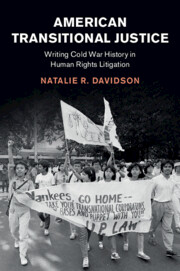Book contents
- American Transitional Justice
- Human Rights in History
- American Transitional Justice
- Copyright page
- Contents
- Figures
- Acknowledgments
- 1 Introduction
- 2 Alien Tort Statute Litigation in Legal Practice and the Legal Imagination
- 3 “Foreign Torture, American Justice”
- 4 Filártiga in Paraguay
- 5 Narrating the Marcos Regime in US Courts
- 6 The Marcos Case and Transitional Justice in the Philippines
- 7 Conclusion
- Book part
- Bibliography
- Index
3 - “Foreign Torture, American Justice”
Filártiga in the United States
Published online by Cambridge University Press: 04 June 2020
- American Transitional Justice
- Human Rights in History
- American Transitional Justice
- Copyright page
- Contents
- Figures
- Acknowledgments
- 1 Introduction
- 2 Alien Tort Statute Litigation in Legal Practice and the Legal Imagination
- 3 “Foreign Torture, American Justice”
- 4 Filártiga in Paraguay
- 5 Narrating the Marcos Regime in US Courts
- 6 The Marcos Case and Transitional Justice in the Philippines
- 7 Conclusion
- Book part
- Bibliography
- Index
Summary
This chapter retells Filartiga, in which the son of a leftist opponent to the Stroessner regime was tortured to death in Paraguay, as a story of structural injustice deeply implicating the United States, and explores the historical narratives produced in US courts. It shows that while the plaintiff submissions presented the case as implicating the institutionalized practices of the Paraguayan state, and even managed to reintroduce some of the case’s links to economic injustice, this story of political repression, resistance, and complicity was lost in the simplified narrative produced by the Court of Appeals for the Second Circuit as well as by the subsequent District Court decision awarding damages, in two now often-cited and applauded decisions. The two decisions were framed instead in terms of a universal struggle – that is, a struggle that defies national boundaries and is based on a universally accepted set of values – against individual torturers. Moreover, the plaintiffs insisted on their lawsuit’s compatibility with US foreign policy and in doing so whitewashed decades of US complicity in torture. The courts’ individualized representation of torture further blurred any trace of factual connection of the case to the United States. Discussion of the case in legal and lay commentary echoed this distorted understanding of US–Paraguay relations.
- Type
- Chapter
- Information
- American Transitional JusticeWriting Cold War History in Human Rights Litigation, pp. 38 - 77Publisher: Cambridge University PressPrint publication year: 2020

